完全倒装 PPT
合集下载
高中英语语法 倒装句语法课件(共63张PPT)
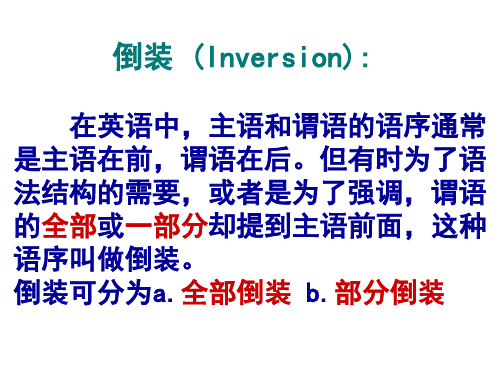
B 3. (2005江苏) ________ about wild plants that they decided to
make a trip to Madagascar for further research.
A. So curions the couple was B. So curious were the couple
open.
A. Try as she might
B. As she might try
C. She might as try
D. Might she as try
33. __D____, the boy knows a lot about computer.
A. Though is he young B. As is he young
3) 介词短语+be+主语 Among the goods are Christmas trees, flowers and toys.
6. 为了保持句子平衡或为了强调表语或状语,为 了使上下文紧密衔接。
a. inside the pyramids are the burial rooms for the s and queens.
如果后一个句子只是单纯的重复前面句子的意 思,则不倒装。
“It is hot today.” “So it is.”
“He finished it on time.” “So he did.”
当前面的句子中主语、谓语或肯否定形式不同时, 则用so it is with….,或it is the same with …句型来表 示。
A are hanging B hanged C hang D hangs
《倒装句公开课》课件

倒装句与其他句型的比较
陈述句
陈述句是常见的句子类型,其结构简 单明了,主要用于描述事实或表达观 点。例如:“The sun rises in the east.”
疑问句
祈使句
祈使句用于表达请求、命令或建议, 其结构简单,通常以动词原形开头。 例如:“Please close the door.”
疑问句通过改变语序来表达疑问或询 问信息,其结构与陈述句不同。例如 :“Where do you live?”
在倒装句中应避免出现冗余重 复的词语,使句子表达更加简
洁明了。
语法错误
在倒装句中应避免出现语法错 误,如时态、语态等。
提高倒装句运用能力的建议
多读多写
通过多读多写,熟悉各种 类型的倒装句,提高对倒 装句的运用能力。
注意观察
在日常生活中注意观察语 言现象,积累语言素材。
勤于思考
在运用倒装句时勤于思考 ,总结规律,加深对倒装 句的理解。
复杂倒装句实例
01 总结词
结构复杂,需要仔细分析
02 详细描述
03 总结词
表达强烈情感或强调某个事实
复杂倒装句通常涉及到多个句 子成分的颠倒,如“Not only did he win the game, but also he scored the most points.”,强调的是“he scored the most points”。
VS
详细描述
倒装句的语法结构有多种形式。其中,前 置词引导的结构是指由前置词引导的倒装 句,如“Here comes the bus”。疑问 句的结构是指疑问句采用倒装的形式,如 “Is she beautiful?”。虚拟语气的结构 是指虚拟语气中的倒装句,如“If only I were you”。
高中英语语法-倒装句课件.ppt
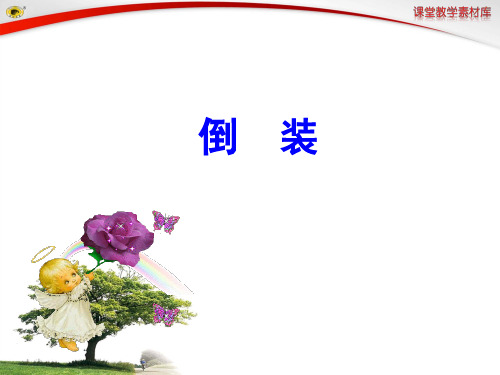
2) There lay a winding brook in front of an old house.
2.方位词in, out, there, here, inside, outside, up, down, away, off, downstairs, upstairs等以及now, then置于句首时,谓语 动词常用be, come, go, lie, run等,并且句子的主语是名词。 为以示强调或为了使情景更生动, 要全部倒装。(全部倒装) 1) Away flew the bird which I bought yesterday. 2) Now comes your turn to sweep the floor. 注意: 主语是人称代词时,仍用自然语序。 Away they went. (=They went away.)
1)Not until the 19th century was the written examination probably known.
2)Not only was everything he had taken away, but also his German citizenship.
3)Not a single mistake did he make.
倒装
倒装
定义
英语句子的自然语序是“主语+谓语”。如果将谓语 的全部或一部分放在主语之前,这种语序被称为“倒装”。
分类 分为全部倒装和部分倒装: 谓语全部放在主语之前,为全部倒装; 只把助动词、连系动词或情态动词放在主语之前,为部分 倒装。
倒装原因 一、 语法结构的需要(如某些疑问句); 二、为了强调; 三、保持句子的平衡或是上下文紧密衔接。
2.用于省略if的虚拟条件从句中,should / were / had 置于 句首。(部分倒装)
2.方位词in, out, there, here, inside, outside, up, down, away, off, downstairs, upstairs等以及now, then置于句首时,谓语 动词常用be, come, go, lie, run等,并且句子的主语是名词。 为以示强调或为了使情景更生动, 要全部倒装。(全部倒装) 1) Away flew the bird which I bought yesterday. 2) Now comes your turn to sweep the floor. 注意: 主语是人称代词时,仍用自然语序。 Away they went. (=They went away.)
1)Not until the 19th century was the written examination probably known.
2)Not only was everything he had taken away, but also his German citizenship.
3)Not a single mistake did he make.
倒装
倒装
定义
英语句子的自然语序是“主语+谓语”。如果将谓语 的全部或一部分放在主语之前,这种语序被称为“倒装”。
分类 分为全部倒装和部分倒装: 谓语全部放在主语之前,为全部倒装; 只把助动词、连系动词或情态动词放在主语之前,为部分 倒装。
倒装原因 一、 语法结构的需要(如某些疑问句); 二、为了强调; 三、保持句子的平衡或是上下文紧密衔接。
2.用于省略if的虚拟条件从句中,should / were / had 置于 句首。(部分倒装)
2024届高考英语倒装句课件(共26张PPT)
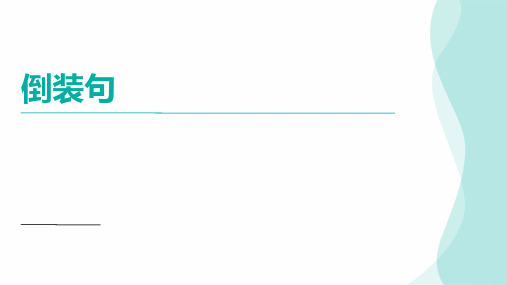
There appear some black clouds in the sky.
试卷讲评课件
4.表语置于句首时e +主语.
e.g. Happy are those who are contented.知足者常乐.
e.g. Present at the meeting were twenty teachers and thirty students.
倒装句
一、完全倒装 二、部分倒装
一、完全倒装
试卷讲评课件
整个谓语放在主语前 结构:谓语动词+主语 e.g. Away went the boy. 那个男孩走开了. 1.表示方向、时间或方位,地点的副词或介词短语,置于句首,用完全倒装. 如: here, there, now, then , up. down.in. out. away. in the room . on the wall 等。(注:主语必须是名词;若主语是代词不能倒装.)
e.g. On the table were some flowers. Then followed three days of heavy rain. Out rushed the children laughing loudly.
试卷讲评课件
2.Such置于句首时,用完全倒装。(注:such / so …that…中, such /so部 分位于句首时,句子用部分倒装.) E.g. Such are the facts: no one can deny them. 这些就是事实,没有人能否定它们. e.g. So much homework did we have to do that we had no time to have a rest.
试卷讲评课件
4.表语置于句首时e +主语.
e.g. Happy are those who are contented.知足者常乐.
e.g. Present at the meeting were twenty teachers and thirty students.
倒装句
一、完全倒装 二、部分倒装
一、完全倒装
试卷讲评课件
整个谓语放在主语前 结构:谓语动词+主语 e.g. Away went the boy. 那个男孩走开了. 1.表示方向、时间或方位,地点的副词或介词短语,置于句首,用完全倒装. 如: here, there, now, then , up. down.in. out. away. in the room . on the wall 等。(注:主语必须是名词;若主语是代词不能倒装.)
e.g. On the table were some flowers. Then followed three days of heavy rain. Out rushed the children laughing loudly.
试卷讲评课件
2.Such置于句首时,用完全倒装。(注:such / so …that…中, such /so部 分位于句首时,句子用部分倒装.) E.g. Such are the facts: no one can deny them. 这些就是事实,没有人能否定它们. e.g. So much homework did we have to do that we had no time to have a rest.
倒装句详解ppt课件
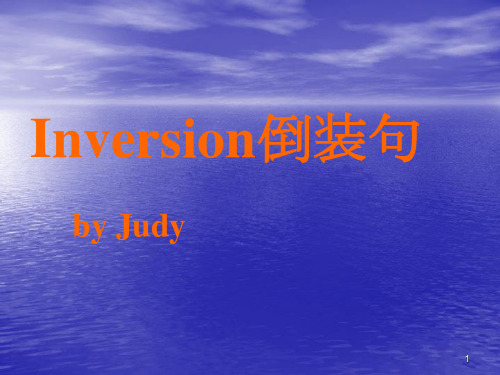
the table. (be) (2) There _l_iv_e_d__ a family of five in the village
five years ago.(live)
2、有时为了突出或强调主语,可用“表语+系动词+
主语”的完全倒装结构。
(3) ________ are the days when teachers were looked
Here you are ! Out they went.
辨 1.Here you are.
1'
别 2.There comes she.
正 误
3.In came the teacher .
4.In came he.
There ________. And here ________. 2'
A. goes the phone; she comes
__b_u__t _a_l_s_o__m__a_k_e_s__u_s__r_e_la__x_e_d_.___________________
归纳:英语的正常语序是“_主_语_ + _谓_语_”。 即主语在_前_,
谓语在_后_。 有时由于句子结构的需要或表示强调,就要采用
_倒_装_形式。将谓语动词完全移到主语之前称为_全_部_倒装;
Inversion倒装句
by Judy
1
Read, change the order and discover the rule
1' 1. Out rushed the children.T_h__e_c__h_i_ld_r_e_n__r_u_s_h__ce_od_m_op_u_let_.t_e_
3. _A_t_t_h_e_f_o_o_t_o_f_t_h_e__h_il_l _s_ta_n_d__s (坐落于山脚下)
five years ago.(live)
2、有时为了突出或强调主语,可用“表语+系动词+
主语”的完全倒装结构。
(3) ________ are the days when teachers were looked
Here you are ! Out they went.
辨 1.Here you are.
1'
别 2.There comes she.
正 误
3.In came the teacher .
4.In came he.
There ________. And here ________. 2'
A. goes the phone; she comes
__b_u__t _a_l_s_o__m__a_k_e_s__u_s__r_e_la__x_e_d_.___________________
归纳:英语的正常语序是“_主_语_ + _谓_语_”。 即主语在_前_,
谓语在_后_。 有时由于句子结构的需要或表示强调,就要采用
_倒_装_形式。将谓语动词完全移到主语之前称为_全_部_倒装;
Inversion倒装句
by Judy
1
Read, change the order and discover the rule
1' 1. Out rushed the children.T_h__e_c__h_i_ld_r_e_n__r_u_s_h__ce_od_m_op_u_let_.t_e_
3. _A_t_t_h_e_f_o_o_t_o_f_t_h_e__h_il_l _s_ta_n_d__s (坐落于山脚下)
英语倒装句PPT

3."分词(代词) + be + 主语"结构。如: Walking at the head of the line was our teacher. Such was the story he told me. 6) ________, a man of achievements, deep thoughts, but with simple habits. A. Einstein was such B. Such was Einstein C. Einstein was so D. So was Einstein 7) ________ are the days when teachers were looked down upon. A. Gone B. Go C. To go D. Going
英语句子通常有两种语序:一种是 陈述语序,一种是倒装语序。 将谓语的一部分或全部置于主语之 前的语序叫做倒装语序。 倒装可分为二种:将整个谓语提到 主 语 之 前 的 叫 完 全 倒 装 ( full inversion); 而只将be 、情态动词或者助动词放 在主语之前的叫做部分倒装 (partial inversion)。
4. "Not only + 分句,but also + 分句"句型中的前 一分句要部分倒装。如:
Not only does John love Chinese, he is also good at speaking it.
但not only...but also...连接主语时,不倒装。如: Not only the mother but also the children are sick. 8) ___ himself wrong, but his friends were wrong. A. Not was only he B. Not only he C. Not only was he D. Not only was
倒装(英语语法倒装句)课件.ppt
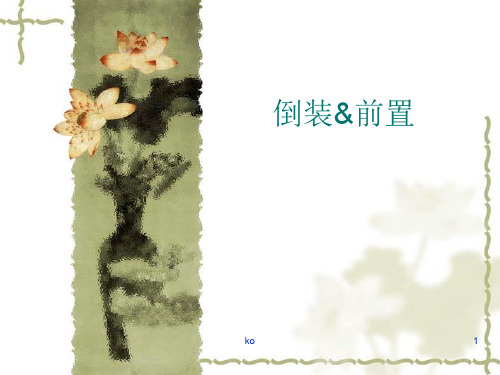
(状语从句中的宾语前置)
You can hardly imagine how fast he drives.
(宾语从句中状语前置)
What books he wants is not clear.
(主语从句中宾语前置)
ko
8
2.修辞倒装 修辞倒装,即由于修辞需要而产生的倒装
1)当“only+状语”用于句首表示强调时,要用倒 装;如果不在句首,则用正常语序。
注意:如特殊疑问句的疑问词提问的是主语,则仍用 正常语序。
Who beat Tom yesterday?
Which bike is yours? 2)there be (或there+其它连系动词)的倒装
There are a lot of people in the hall.
There stands a weather station at the top of the
[1] Never shall I forget this lesson. (倒装) I shall never forget this lesson. (正常)
[2] Not only was Churchill a statesman, but also he was a poet. (倒装)
knowledge he has (宾语前置).
ko
7
c) 在疑问词或连接词whether等引导的从句中 的前置
I don’t know who he is.
(宾语从句中的表语前置)
Whatever advice you may offer, it will be of value to us.
We realized that there was a mistake only
You can hardly imagine how fast he drives.
(宾语从句中状语前置)
What books he wants is not clear.
(主语从句中宾语前置)
ko
8
2.修辞倒装 修辞倒装,即由于修辞需要而产生的倒装
1)当“only+状语”用于句首表示强调时,要用倒 装;如果不在句首,则用正常语序。
注意:如特殊疑问句的疑问词提问的是主语,则仍用 正常语序。
Who beat Tom yesterday?
Which bike is yours? 2)there be (或there+其它连系动词)的倒装
There are a lot of people in the hall.
There stands a weather station at the top of the
[1] Never shall I forget this lesson. (倒装) I shall never forget this lesson. (正常)
[2] Not only was Churchill a statesman, but also he was a poet. (倒装)
knowledge he has (宾语前置).
ko
7
c) 在疑问词或连接词whether等引导的从句中 的前置
I don’t know who he is.
(宾语从句中的表语前置)
Whatever advice you may offer, it will be of value to us.
We realized that there was a mistake only
倒装句讲解精品PPT课件全文
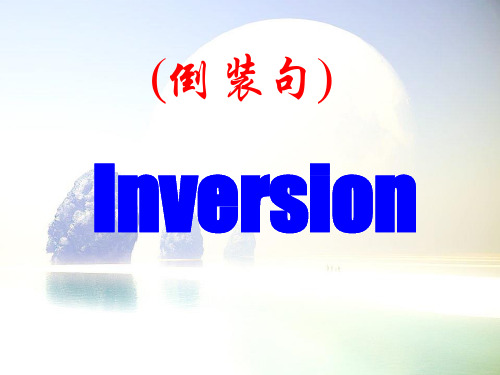
❖ 6. Especially popular were his Sunday evening dinners, usually followed by musical performances.
❖ 7. Only in recent years have women begun to catch up with men in this area.
2)当这些词作形容词修饰主语时且置句首 时,句子不倒装。 Little work was done yesterday.
5.Neither..nor连接的两个句子都要倒装; not only…but also连接的两个句子时, not only后面的句子要倒装, but also不倒装
1)Neither has he called on her, nor will he do so. 2)Not only shall we learn from books,
No sooner had they entered the house than it began to rain.
注意
1)当上述单词不提前时,则不倒装。 I seldom read newspaper before. He had hardly finished his homework when the light went out.
一、完全倒装
1. 在there, here 引导的句子中,谓语是 be, exist, live,lie 等表示状态的不及 物动词。
There is nobody in the classroom. There seems something wrong with my radio. There stands a temple on the top of the mountain.
❖ 7. Only in recent years have women begun to catch up with men in this area.
2)当这些词作形容词修饰主语时且置句首 时,句子不倒装。 Little work was done yesterday.
5.Neither..nor连接的两个句子都要倒装; not only…but also连接的两个句子时, not only后面的句子要倒装, but also不倒装
1)Neither has he called on her, nor will he do so. 2)Not only shall we learn from books,
No sooner had they entered the house than it began to rain.
注意
1)当上述单词不提前时,则不倒装。 I seldom read newspaper before. He had hardly finished his homework when the light went out.
一、完全倒装
1. 在there, here 引导的句子中,谓语是 be, exist, live,lie 等表示状态的不及 物动词。
There is nobody in the classroom. There seems something wrong with my radio. There stands a temple on the top of the mountain.
高中英语语法——倒装(35张PPT)-经典通用课件资料

terrible Genie
neither/ nor did he stood a
助动词auxiliary/情态动词modal verb + subject + v +…
Nerve will I forgive you.
2021/10/10
4
全部倒装 1. 用于 there be 句型。
There are many students in the classroom.
原句自然顺序是: Many students are there in the classroom.
Grammar Inversion
2021/10/10
1
语法精解
1. 倒装 Inversions 英语句子的自然顺序是主语在前, 谓语在后。把谓语动词放在主语之前, 就叫倒装结构。如果全部谓语 放在主语之前, 叫全部倒装; 如果只把助动词或be 动词放在主语之前就叫部分倒装。
2021/10/10
2
主语位于谓语are there之后
2021/10/10
5
2. 用于“here (there, now, then) + 不及物动词 + 主语的句型中, 或以out, in, up, down, away 等副词开头 的句子里面,表示强调。
2021/10/10
6
Here comes the bus.
Hardly had she gone out
2021/10/10
32
3. I didn’t go there. He didn’t go there either. I didn’t go there, ________________.
4. A terrible Genie (妖怪) stood before the fisherman. Before the fisherman ______ _____________.
neither/ nor did he stood a
助动词auxiliary/情态动词modal verb + subject + v +…
Nerve will I forgive you.
2021/10/10
4
全部倒装 1. 用于 there be 句型。
There are many students in the classroom.
原句自然顺序是: Many students are there in the classroom.
Grammar Inversion
2021/10/10
1
语法精解
1. 倒装 Inversions 英语句子的自然顺序是主语在前, 谓语在后。把谓语动词放在主语之前, 就叫倒装结构。如果全部谓语 放在主语之前, 叫全部倒装; 如果只把助动词或be 动词放在主语之前就叫部分倒装。
2021/10/10
2
主语位于谓语are there之后
2021/10/10
5
2. 用于“here (there, now, then) + 不及物动词 + 主语的句型中, 或以out, in, up, down, away 等副词开头 的句子里面,表示强调。
2021/10/10
6
Here comes the bus.
Hardly had she gone out
2021/10/10
32
3. I didn’t go there. He didn’t go there either. I didn’t go there, ________________.
4. A terrible Genie (妖怪) stood before the fisherman. Before the fisherman ______ _____________.
高三英语复习专题课件:完全倒装和形式倒装 (共33张PPT)
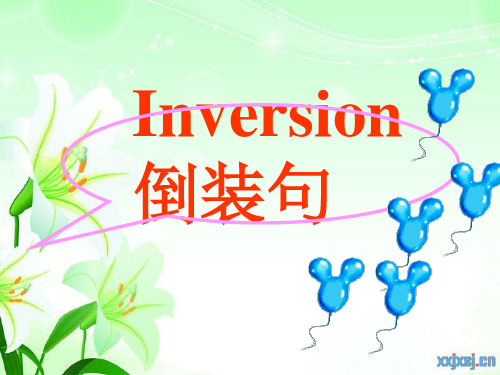
前置成分+助动词+主语+谓语动词 部分倒装语序
倒装
之
全部倒装
1.一只小狗坐在房间外。 (outside) A little dog sits outside the rode the room sits a little dog.
(lie in ) 2.一个小工厂位于小河的南面。 A small factory lies in south of the river ★ ★ ★ ★ ★ In south of the river lies a small factory.
那个男孩走开了。 Away went the boy. 小孩子冲了出来。 Out rushed the children.
Conclusion 2: out _____, now here there in 当_____, ____, _____, ____, away off 等 副词 then ____ up ,_____ down ,____,_____ ______, 句首 时, 句子就用________. 全部倒装 置于_______
3.开平现存1833座碉楼。 exist There ________________1833 watchtowers in Kaiping.
翻译句子
1.现在结果出来了。 Now comes the result.
2.当你明白了的时候,时间已经溜走了。
Away went the time when you ___________________ understood it.
全部倒装之三: 【翻译句子】(8 points for each) 1.山顶上有一幢高楼。 There is a tall building _______________________on the top of the mountain. 2.山顶上耸立着一座古塔. There stands an ancient tower ___________________________on the top of the mountain.
倒装
之
全部倒装
1.一只小狗坐在房间外。 (outside) A little dog sits outside the rode the room sits a little dog.
(lie in ) 2.一个小工厂位于小河的南面。 A small factory lies in south of the river ★ ★ ★ ★ ★ In south of the river lies a small factory.
那个男孩走开了。 Away went the boy. 小孩子冲了出来。 Out rushed the children.
Conclusion 2: out _____, now here there in 当_____, ____, _____, ____, away off 等 副词 then ____ up ,_____ down ,____,_____ ______, 句首 时, 句子就用________. 全部倒装 置于_______
3.开平现存1833座碉楼。 exist There ________________1833 watchtowers in Kaiping.
翻译句子
1.现在结果出来了。 Now comes the result.
2.当你明白了的时候,时间已经溜走了。
Away went the time when you ___________________ understood it.
全部倒装之三: 【翻译句子】(8 points for each) 1.山顶上有一幢高楼。 There is a tall building _______________________on the top of the mountain. 2.山顶上耸立着一座古塔. There stands an ancient tower ___________________________on the top of the mountain.
高考英语倒装句 ppt

Let’s have a try:
Not only __________ interested in football but also _____________ beginning to show an interest in it.
A. The teacher himself is/ all his students are B. The teacher himself is/ are all his students C. Is the teacher himself/ are all his students D. Is the teacher himself/ all his students are
2. 倒装句中不用进行时态. 倒装句中不用进行时态 B ___ the plane. A. Flew down B. Down flew C. Down was flying D. Down fly
四、部分倒装
1. 否定副词放句首如never, seldom, little,
hardly, in no way 等
(1) I could hardly believe it was true.
Hardly could I believe it was true.
(2)We seldom hear her reading aloud because she is too shy.
3. Hardly…when… No sooner…than…
一…就… 就
我一到火车站,火车就开了。 我一到火车站,火车就开了。 Hardly had I reached the railway station when the train began to move.
倒装句 (共41张PPT)
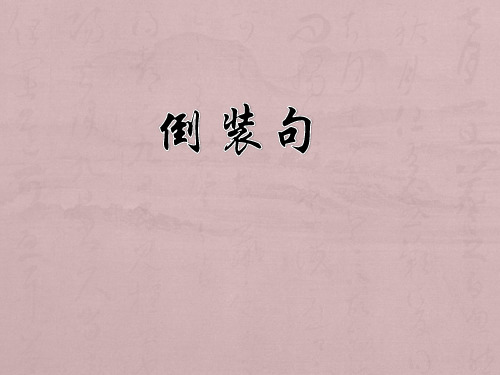
4 so, neither, nor作部分倒装
表示"也"、"也不" 的句子要部分倒 装。 1) Tom can speak French. So can Jack. 2) If you won't/don’t go, neither will I.
典型例题
1) ---Do you know Jim quarrelled with his brother?
1) 句首为否定词,如no, not, never, seldom, little, hardly, at no time, in no way, not until… 等。
1). Never have I seen such a performance.
2). Nowhere will you find the answer to this question.
A bad-tempered man as he is , =(Although he is a bad-tempered man), he loves me deeply.
7. 其他部分倒装
1)so… that 句型中的so 位于句首 时,需倒装。
e.g.: So frightened was he that he did not dare to move an inch.
3 Not only ___ interested in football but ___ beginning to show an interest in. A. the teacher himself is ; all his students are B. the teacher himself is ; are all his students C. is the teacher himself ; are all his students D. is the teacher himself ; all hioner___ than it began to rain heavily.
倒装句课件-完整版

倒装句课件-完整版
目录
• 倒装句的定义与分类 • 倒装句的构成与使用条件 • 倒装句的语法功能与作用 • 倒装句的常见类型与例句 • 练习与巩固
01
倒装句的定义与分类
什么是倒装句
总结词
倒装句是一种特殊的语法结构,通过改变正常语序来强调或表达特定的含义。
详细描述
倒装句是一种为了强调某些内容或达到某种特殊的表达效果,而故意将句子中 的词语顺序颠倒的语法结构。通过倒装,可以将句子的重点突出,使表达更加 生动有力。
2. 部分倒装句和完全倒装句
根据倒装的范围,可以将倒装句分为部分倒装句和完全倒装句。部分倒 装句只将句子的一部分进行颠倒,而完全倒装句则将整个句子进行颠倒。
02
倒装句的构成与使用条件
倒装句的构成要素
谓语倒装
将谓语放在了主语 之后,通常是为了 强调谓语。
定语倒装
将定语放在了中心 词之后,通常是为 了强调定语。
04
倒装句的常见类型与例句
部分倒装常见类型与例句
总结词
部分倒装是指将谓语的一部分(如助动词或情态动词)放在主语之前,而将剩余 部分放在主语之后的句子结构。
详细描述
在部分倒装句中,助动词或情态动词被提前至主语之前,例如"Were it not for your help, I would not have succeeded."(要不是你的帮助,我不会成功。)
03
倒装句的语法功能与作用
倒装句的语法功能
强调功能
倒装句通过改变语序,将需要强 调的信息放在句首,以突出强调 某个部分,使表达更加鲜明有力。
衔接功能
在语篇中,倒装句可以起到衔接上 下文的作用,通过倒装来连接两个 句子或段落,使语篇更加流畅自然。
目录
• 倒装句的定义与分类 • 倒装句的构成与使用条件 • 倒装句的语法功能与作用 • 倒装句的常见类型与例句 • 练习与巩固
01
倒装句的定义与分类
什么是倒装句
总结词
倒装句是一种特殊的语法结构,通过改变正常语序来强调或表达特定的含义。
详细描述
倒装句是一种为了强调某些内容或达到某种特殊的表达效果,而故意将句子中 的词语顺序颠倒的语法结构。通过倒装,可以将句子的重点突出,使表达更加 生动有力。
2. 部分倒装句和完全倒装句
根据倒装的范围,可以将倒装句分为部分倒装句和完全倒装句。部分倒 装句只将句子的一部分进行颠倒,而完全倒装句则将整个句子进行颠倒。
02
倒装句的构成与使用条件
倒装句的构成要素
谓语倒装
将谓语放在了主语 之后,通常是为了 强调谓语。
定语倒装
将定语放在了中心 词之后,通常是为 了强调定语。
04
倒装句的常见类型与例句
部分倒装常见类型与例句
总结词
部分倒装是指将谓语的一部分(如助动词或情态动词)放在主语之前,而将剩余 部分放在主语之后的句子结构。
详细描述
在部分倒装句中,助动词或情态动词被提前至主语之前,例如"Were it not for your help, I would not have succeeded."(要不是你的帮助,我不会成功。)
03
倒装句的语法功能与作用
倒装句的语法功能
强调功能
倒装句通过改变语序,将需要强 调的信息放在句首,以突出强调 某个部分,使表达更加鲜明有力。
衔接功能
在语篇中,倒装句可以起到衔接上 下文的作用,通过倒装来连接两个 句子或段落,使语篇更加流畅自然。
五全八部话倒装ppt课件
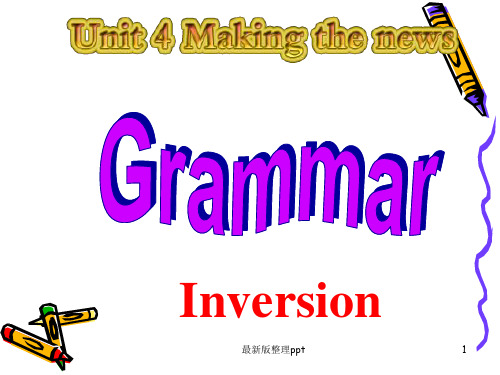
A.Only by working hard we can
B.By only working hard we can
_N_o_t _u_n_til then _d_id_ I realize how lucky
I was.直到那时我才意识到我有多幸运。
最新版整理ppt
18
2) No sooner…than… Hardly …when… Scarcely …when…
位于句首
Hardly had they gone out of the classroom when it began to rain.
有时表 地方
in, out, up, down, (方位)away,off
The balloons flew up. Up flew the balloons. Up flew they.(?) Up they flew.
注意!
• 全部倒装中代词不倒装 • Here you are. • Now she comes. • Out he ran.
not until not only… but also hardly…when, no sooner… than
• He did not make a single mistake.
• Not a single mistake did he make.
最新版整理ppt
15
1.not …until…
有 时 表 地方
here, there, in the front of, in the distance…
A teacher stands in the front of the classroom. In the front of the classroom stands a teacher.
- 1、下载文档前请自行甄别文档内容的完整性,平台不提供额外的编辑、内容补充、找答案等附加服务。
- 2、"仅部分预览"的文档,不可在线预览部分如存在完整性等问题,可反馈申请退款(可完整预览的文档不适用该条件!)。
- 3、如文档侵犯您的权益,请联系客服反馈,我们会尽快为您处理(人工客服工作时间:9:00-18:30)。
7.用在感叹句中 How happy we are! What a terrible noise the machine makes! What a beautiful picture that is!
8.用在表示“祝愿”的句子中
May you succeed. Long live our motherland
Such was Albert Einstein, a simple man of great achievements. The children listened quietly to the story. Great was their fear.
6.用在省略了的条件句中
1) Should he meet me, he would know me. = If he should meet me, he would know me.
Thus was the Emperor deceived. = The Emperor was thus deceived.
3.副词only及其修饰的状语放在句首时
Only then did I realize the importance of English. = I realized the importance of English only then.
• Hardly did I think it possible.
• 2) Not only should we not be afraid of difficulties, but we should try our best to overcome them.
• 3) By no means will this method be satisfactory.
当主语是代词时,句子不倒装。 In he came and the lesson began.
3.表示方位的短语放在句首时 In front of the farm house sat a small boy. All around the fox in a circle were the dogs. Nearby is the Indianapolis race course.(1991阅读) Outside were two men, neatly dressed in grey suits.(1995 阅读) 4.直接引语的引述短语的倒装
• The first one wasn’t good and (第二个也不好)
• nor / neither was the second.
* * 1)----It was hot yesterday.
---- So it was.
(确实如此)
2)----He works hard.
---- So he does.
“What do you want?” asked the man. “Miss Li,” said the officer, “would you mind my smoking here?”
二、部分倒装
(只把助动词、情态动词、系动词或表语放在 主语之前)
1、有否定含义的副词放在句首时 (never, hardly, scarcely, not only, nor, seldom, little, rarely, nowhere, by no means, not until, hardly…when, no sooner…than, ect.)
INVERSION 倒装句
一、完全倒装(整个谓语移至主语的前面)
1. Here, there, now, then 放在句首时 Here is a letter for you. There comes the bus. There are different forms of energy. There flows a small river in front of the village. Now comes your turn. 当主语是代词时, 句子不倒装。 Here you are. There he comes.
(确实如此)
大家有疑问的,可以询问句子中
Tired as / though he was, he went on working. = Although / Though he was tired, … Child as / though she is, she knows a great deal. = Although / Though she is a child,…
2) Were I you, I would go there alone.
= If I were you, I would go there alone 3) Had he finished reading the book, he would have returned it to the library. = If he had finished reading the book, he would have returned it to the library.
Only when the war was over in 1918 was he able to get happily back to work. = He was able to get happily back to work only when the war was over in 1918.
Ex. : 1) Not until midnight did it stop raining. = It didn’t stop raining until midnight.
2) They had no sooner got to the plant than they started to work. = No sooner had they got to the plant than they started to work.
Often had I intended to speak of it. Many a time has he helped me with experiment. So fast does light travel that it is difficult for us to imagine its speed. So busy is he that he has no time to spare. = He is so busy that he has not time to spare.
4.以so, neither, nor开头,表示另一人或物“也一样” 或“也不这样”
• He saw it, and so did I.
(我也看见)
• They can swim. So can we. (我们也会)
• You can’t do it. Nor / Neither can I(. 我也不会)
2. in, out, down, up, back, over, away, off放在 句首时
In came the teacher and the lesson began. Down fell the bowl on the ground. Up into the sky flew the arrow. Away went the angry old couple. Out rushed the young man.
3) I have never seen such a man. = Never have I seen such a man.
2.频度副词和短语放在句首时 ( often, always, once, many a time, so+adj/adv., thus, now and again, every other day, ect.)
